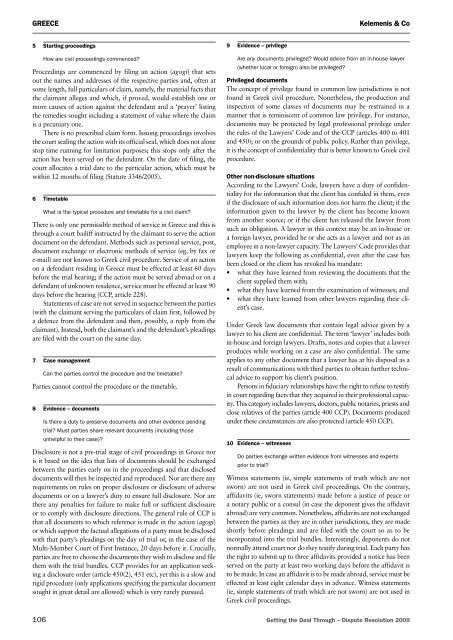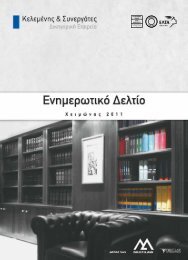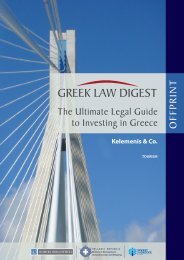Dispute Resolution - Kelemenis.com
Dispute Resolution - Kelemenis.com
Dispute Resolution - Kelemenis.com
You also want an ePaper? Increase the reach of your titles
YUMPU automatically turns print PDFs into web optimized ePapers that Google loves.
greece<br />
<strong>Kelemenis</strong> & Co<br />
5 Starting proceedings<br />
How are civil proceedings <strong>com</strong>menced<br />
Proceedings are <strong>com</strong>menced by filing an action (agogi) that sets<br />
out the names and addresses of the respective parties and, often at<br />
some length, full particulars of claim, namely, the material facts that<br />
the claimant alleges and which, if proved, would establish one or<br />
more causes of action against the defendant and a ‘prayer’ listing<br />
the remedies sought including a statement of value where the claim<br />
is a pecuniary one.<br />
There is no prescribed claim form. Issuing proceedings involves<br />
the court sealing the action with its official seal, which does not alone<br />
stop time running for limitation purposes; this stops only after the<br />
action has been served on the defendant. On the date of filing, the<br />
court allocates a trial date to the particular action, which must be<br />
within 12 months of filing (Statute 3346/2005).<br />
6 Timetable<br />
What is the typical procedure and timetable for a civil claim<br />
There is only one permissible method of service in Greece and this is<br />
through a court bailiff instructed by the claimant to serve the action<br />
document on the defendant. Methods such as personal service, post,<br />
document exchange or electronic methods of service (eg, by fax or<br />
e-mail) are not known to Greek civil procedure. Service of an action<br />
on a defendant residing in Greece must be effected at least 60 days<br />
before the trial hearing; if the action must be served abroad or on a<br />
defendant of unknown residence, service must be effected at least 90<br />
days before the hearing (CCP, article 228).<br />
Statements of case are not served in sequence between the parties<br />
(with the claimant serving the particulars of claim first, followed by<br />
a defence from the defendant and then, possibly, a reply from the<br />
claimant). Instead, both the claimant’s and the defendant’s pleadings<br />
are filed with the court on the same day.<br />
7 Case management<br />
Can the parties control the procedure and the timetable<br />
Parties cannot control the procedure or the timetable.<br />
8 Evidence – documents<br />
Is there a duty to preserve documents and other evidence pending<br />
trial Must parties share relevant documents (including those<br />
unhelpful to their case)<br />
Disclosure is not a pre-trial stage of civil proceedings in Greece nor<br />
is it based on the idea that lists of documents should be exchanged<br />
between the parties early on in the proceedings and that disclosed<br />
documents will then be inspected and reproduced. Nor are there any<br />
requirements on rules on proper disclosure or disclosure of adverse<br />
documents or on a lawyer’s duty to ensure full disclosure. Nor are<br />
there any penalties for failure to make full or sufficient disclosure<br />
or to <strong>com</strong>ply with disclosure directions. The general rule of CCP is<br />
that all documents to which reference is made in the action (agogi)<br />
or which support the factual allegations of a party must be disclosed<br />
with that party’s pleadings on the day of trial or, in the case of the<br />
Multi-Member Court of First Instance, 20 days before it. Crucially,<br />
parties are free to choose the documents they wish to disclose and file<br />
them with the trial bundles. CCP provides for an application seeking<br />
a disclosure order (article 450(2), 451 etc), yet this is a slow and<br />
rigid procedure (only applications specifying the particular document<br />
sought in great detail are allowed) which is very rarely pursued.<br />
9 Evidence – privilege<br />
Are any documents privileged Would advice from an in-house lawyer<br />
(whether local or foreign) also be privileged<br />
Privileged documents<br />
The concept of privilege found in <strong>com</strong>mon law jurisdictions is not<br />
found in Greek civil procedure. Nonetheless, the production and<br />
inspection of some classes of documents may be restrained in a<br />
manner that is reminiscent of <strong>com</strong>mon law privilege. For instance,<br />
documents may be protected by legal professional privilege under<br />
the rules of the Lawyers’ Code and of the CCP (articles 400 to 401<br />
and 450); or on the grounds of public policy. Rather than privilege,<br />
it is the concept of confidentiality that is better known to Greek civil<br />
procedure.<br />
Other non-disclosure situations<br />
According to the Lawyers’ Code, lawyers have a duty of confidentiality<br />
for the information that the client has confided in them, even<br />
if the disclosure of such information does not harm the client; if the<br />
information given to the lawyer by the client has be<strong>com</strong>e known<br />
from another source; or if the client has released the lawyer from<br />
such an obligation. A lawyer in this context may be an in-house or<br />
a foreign lawyer, provided he or she acts as a lawyer and not as an<br />
employee in a non-lawyer capacity. The Lawyers’ Code provides that<br />
lawyers keep the following as confidential, even after the case has<br />
been closed or the client has revoked his mandate:<br />
• what they have learned from reviewing the documents that the<br />
client supplied them with;<br />
• what they have learned from the examination of witnesses; and<br />
• what they have learned from other lawyers regarding their client’s<br />
case.<br />
Under Greek law documents that contain legal advice given by a<br />
lawyer to his client are confidential. The term ‘lawyer’ includes both<br />
in-house and foreign lawyers. Drafts, notes and copies that a lawyer<br />
produces while working on a case are also confidential. The same<br />
applies to any other document that a lawyer has at his disposal as a<br />
result of <strong>com</strong>munications with third parties to obtain further technical<br />
advice to support his client’s position.<br />
Persons in fiduciary relationships have the right to refuse to testify<br />
in court regarding facts that they acquired in their professional capacity.<br />
This category includes lawyers, doctors, public notaries, priests and<br />
close relatives of the parties (article 400 CCP). Documents produced<br />
under these circumstances are also protected (article 450 CCP).<br />
10 Evidence – witnesses<br />
Do parties exchange written evidence from witnesses and experts<br />
prior to trial<br />
Witness statements (ie, simple statements of truth which are not<br />
sworn) are not used in Greek civil proceedings. On the contrary,<br />
affidavits (ie, sworn statements) made before a justice of peace or<br />
a notary public or a consul (in case the deponent gives the affidavit<br />
abroad) are very <strong>com</strong>mon. Nonetheless, affidavits are not exchanged<br />
between the parties as they are in other jurisdictions, they are made<br />
shortly before pleadings and are filed with the court so as to be<br />
incorporated into the trial bundles. Interestingly, deponents do not<br />
normally attend court nor do they testify during trial. Each party has<br />
the right to submit up to three affidavits provided a notice has been<br />
served on the party at least two working days before the affidavit is<br />
to be made. In case an affidavit is to be made abroad, service must be<br />
effected at least eight calendar days in advance. Witness statements<br />
(ie, simple statements of truth which are not sworn) are not used in<br />
Greek civil proceedings.<br />
106 Getting the Deal Through – <strong>Dispute</strong> <strong>Resolution</strong> 2009





